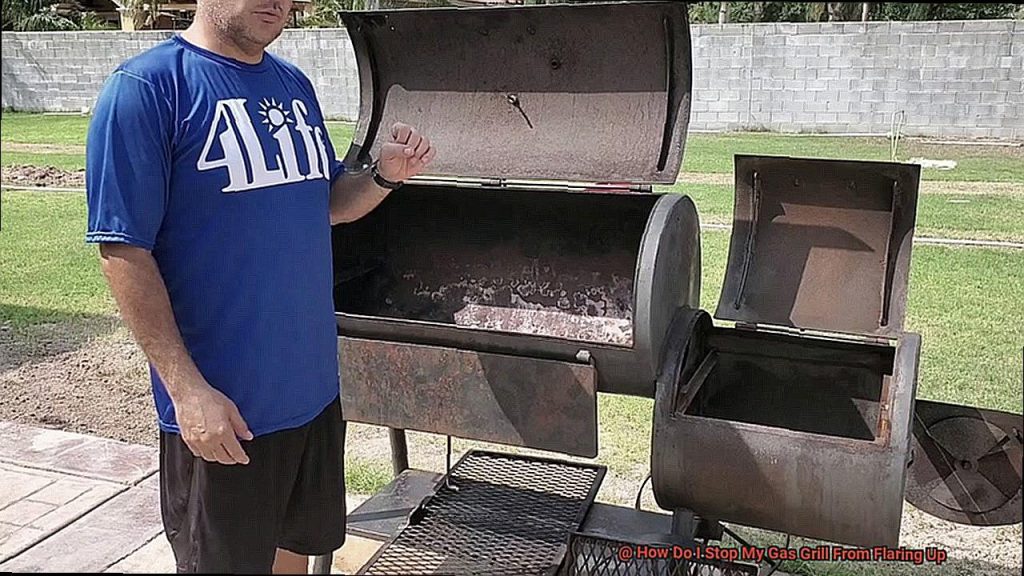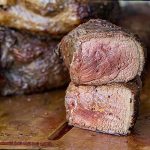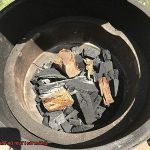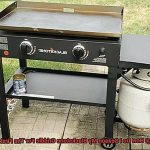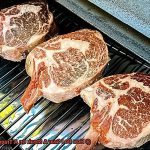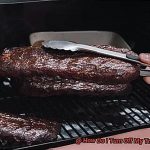Do you dread firing up your gas grill for fear of uncontrollable flames? Have you ever watched helplessly as your perfectly marinated meat turned into a charred mess? Fear not, my fellow grill enthusiasts. Flare-ups are a common problem, but with the right techniques and know-how, you can keep them under control.
Don’t let flare-ups ruin your barbecue bliss. With just a few simple adjustments to your grilling routine, you can become the master of the flame. In this blog post, we’ll delve into the root causes of flare-ups and give you practical tips on how to prevent them from happening in the first place.
From mastering indirect heat to strategically using drip trays, we’ve got all the insider secrets to help you achieve perfect grill marks every time. Whether you’re an experienced grill guru or just starting out, our step-by-step guide will make sure that your next cookout is a sizzling success.
So, get ready to take your grilling game to the next level. Your taste buds (and your guests) will thank you for it.
Contents
Cleaning Your Grill Grates Regularly
These flames not only cause uneven cooking but can also pose a safety hazard if not handled correctly. Fortunately, by regularly cleaning and oiling your grill grates, you can prevent flare-ups and enjoy a safe and hassle-free grilling experience every time.
The process of cleaning your grill grates is easy and straightforward. To start, turn on your gas grill and let it heat up for 10-15 minutes. This helps burn off any excess debris on the grates, making them easier to clean. Once heated, use a wire brush to scrub the grates thoroughly, removing any remaining debris. For those stubborn or hard-to-remove build-ups, a grill cleaner or degreaser can be used to break down grease and other tough stains.
After cleaning your grill grates, it’s important to oil them before cooking. This prevents food from sticking and creates a barrier between the grates and potential flare-ups. You can easily oil your grates by dipping a paper towel in vegetable oil and using tongs to rub it over the grates.
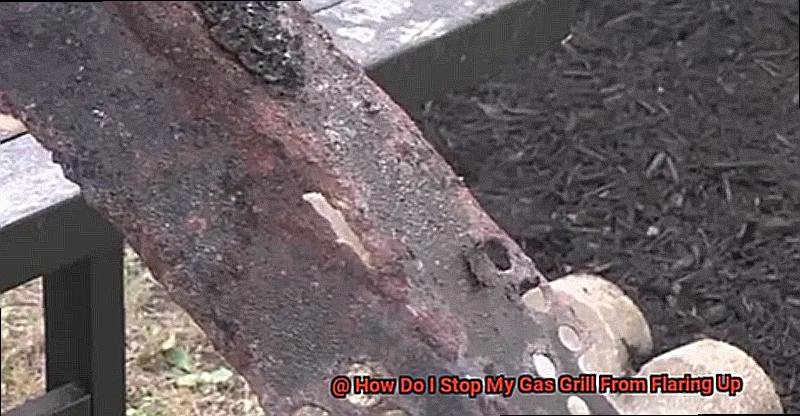
Apart from regular cleaning and oiling of your grill grates, there are other steps you can take to prevent flare-ups on your gas grill. Before grilling, make sure to trim excess fat from meats to prevent excess grease from dripping onto the flames. High heat levels can also cause more flames, so try lowering the temperature and cooking your food for a longer period of time. This allows for a more even cook and reduces the chance of flare-ups.
Using marinades or rubs on your meats can also help prevent flare-ups by creating moisture and flavor that creates a barrier between the meat and flames. And if you do experience flare-ups while grilling, don’t panic. Move your food to a cooler part of the grill or temporarily turn off the burners until the flames subside. Always keep a spray bottle of water nearby in case of emergency.
Trimming Excess Fat from Meats Before Grilling
Grilling is a beloved pastime, but nothing can ruin the experience faster than flare-ups caused by excess fat dripping onto the grill grates. Luckily, there’s a simple way to prevent flare-ups and create healthier and more delicious grilled dishes: trimming excess fat from meats before grilling.
Why is it important to trim excess fat? Not only does it reduce the risk of dangerous flare-ups that can lead to unevenly cooked meat or even fires, but it also makes for a healthier and more flavorful meal. Fatty cuts of meat can be higher in calories and saturated fat, and they can mask the natural flavors of the meat. By removing excess fat, you’ll be able to taste the true flavors of the meat and enjoy a healthier meal.
To start, choose leaner cuts of meat like sirloin, flank steak, or chicken breasts instead of fatty cuts like ribeye or pork belly. Then, use a sharp knife to remove any visible fat, leaving a thin layer for flavor and moisture. If you’re worried about losing flavor when trimming fat, try marinating your meat before grilling. Marinades add flavor and help reduce flare-ups by creating a barrier between the meat and the heat source. Opt for acidic marinades with ingredients like vinegar or citrus juices, as they also help tenderize the meat.
One crucial tip that’s often overlooked is keeping your grill clean. Before grilling, remove any excess grease or food residue from the grates, and clean your grill after each use to prevent buildup. Not only will this prevent flare-ups, but it’ll also ensure even cooking and better flavor.
To summarize, here are some key tips for trimming excess fat from meats before grilling:
- Choose leaner cuts of meat
- Use a sharp knife to remove visible fat
- Marinate your meat with acidic ingredients
- Keep your grill clean
Utilizing a Drip Tray or Foil Underneath the Grates
Grilling is a sensory experience that triggers mouth-watering cravings. However, nothing can ruin your grilling game like flare-ups caused by excess grease and oil dripping onto the heat source. But fear not. There’s an easy solution: utilizing a drip tray or aluminum foil underneath the grates.
By placing a drip tray or foil underneath the grates, excess grease and oil can be caught and prevented from reaching the heat source. This simple step can help prevent flare-ups, ensure that your food is cooked evenly, and prevent unwanted burning or charring.
Here are some subtopics on how to use a drip tray or foil to level up your grilling game:
Choose the right drip tray or make a makeshift one with aluminum foil. Ensure it fits your grill size and is made of durable materials that can withstand high temperatures.
Place the drip tray or foil underneath the grates before turning on the grill. Leave enough space between the tray and the heat source to prevent it from melting or catching fire.
Monitor the drip tray or foil regularly to ensure it does not overflow with grease. If it does, carefully remove it and dispose of any excess grease properly.
But wait, there’s more. Utilizing a drip tray or foil is just one of many ways to improve your grilling experience. Trimming the fat from meats before grilling, choosing leaner cuts of meat, using a sharp knife to remove visible fat, marinating with acidic ingredients, and keeping the grill clean are all great ways to create a healthier and more flavorful meal.
Adjusting the Heat Level of Your Grill
One of the most crucial steps in achieving the perfect sear without any flare-ups is adjusting the heat level of your grill. Let’s explore some tips and tricks to help you adjust the heat level of your grill for different types of food.
The first step in adjusting the heat level of your grill is preheating it. Preheating ensures that the grates are hot enough to sear your food properly. It also prevents sticking and burns off any residue from previous cookouts.
Once your grill is preheated, you can adjust the heat level by manipulating the burners. Most gas grills have two or three burners, each controlled by a knob on the front panel. To decrease the heat, turn down the knobs on all burners. Conversely, to increase the heat, turn up the knobs on one or more burners.
It’s worth noting that different foods require different levels of heat. Burgers and steaks require high heat for a quick sear, while chicken and fish need lower heat to cook through without burning. It’s essential to consult a cooking chart or recipe for specific temperature recommendations.
To prevent flare-ups, use a drip pan. Place a disposable aluminum pan under the grill grates to catch any drippings. This not only prevents flare-ups but also makes cleanup easier.
Another tip to avoid flare-ups is to trim excess fat from your meat and avoid overcrowding on the grill. Overcrowding can cause grease to accumulate and increase the risk of flare-ups.
Using Marinades or Rubs on Meats
Grilling is a culinary experience that brings people together, and using marinades or rubs on meats can take your meal to the next level. Not only do they add mouth-watering flavor and tenderness, but they also help prevent your meat from drying out. However, there’s a potential challenge – flare-ups.
Flare-ups occur when fat or marinade drips onto the flames of the grill, causing sudden bursts of flame that can burn your food and ruin your masterpiece. But fear not. There are ways to prevent flare-ups when using marinades or rubs on meats.
Firstly, make sure to pat your meat dry before placing it on the grill. This simple step removes any excess marinade or moisture that could cause flare-ups. Secondly, use indirect heat when grilling marinated meats by placing the meat on a part of the grill that is not directly over the flames. This method allows the meat to cook slowly and evenly without causing flare-ups.
When it comes to rubs, be mindful of the ingredients you choose. Avoid rubs that contain sugar or other ingredients that can burn easily. If you do choose a rub with these ingredients, apply it towards the end of the cooking process to prevent burning.
To summarize, using marinades or rubs on meats is an excellent way to enhance your grilled dishes. However, it’s vital to keep flare-ups in mind, follow these tips, and use indirect heat to avoid any mishaps.
Here are some additional tips:
- Marinate your meat for at least 30 minutes before grilling for maximum flavor.
- Don’t reuse marinade once it’s been in contact with raw meat.
- Use a meat thermometer to ensure your meat is cooked thoroughly.
- Experiment with different marinades and rubs to find your favorite flavor combinations.
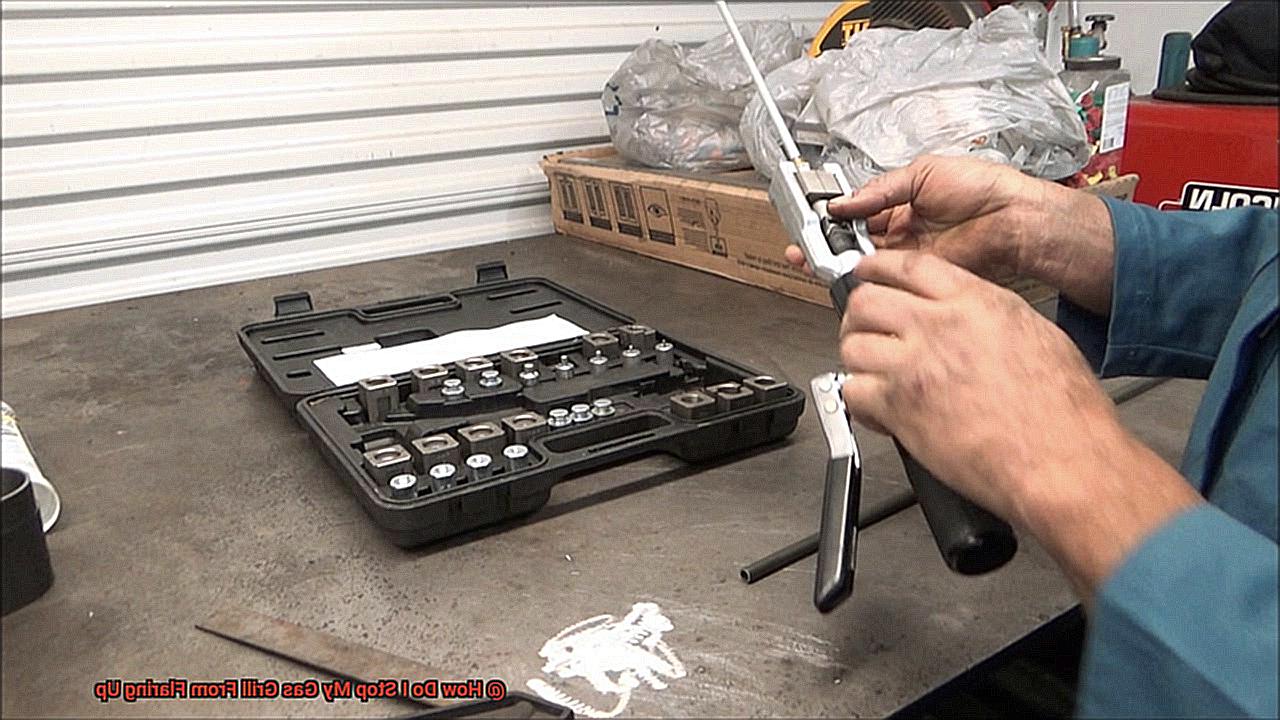
Keeping a Spray Bottle of Water Nearby
There’s a simple and effective solution: keep a spray bottle of water nearby. This handy tool is a must-have for any grill master looking to prevent flare-ups and enjoy perfectly grilled food every time.
Flare-ups occur when fat or oil drips onto the hot grates, causing flames to shoot up and scorch the food. But with a spray bottle of water within reach, you can quickly extinguish any flames before they get out of control. To use it, simply point the nozzle towards the flames and spray a small burst of water onto the affected area. Be careful not to use too much water, as this can cause steam to form and potentially burn you. Use small bursts until the flames have subsided.
However, it’s important to note that while a spray bottle of water can help prevent flare-ups, it’s not a foolproof solution. You should also clean your grill regularly to remove any excess grease or debris, trim excess fat from your meat before grilling, and avoid using marinades or sauces that contain oil.
In addition to preventing flare-ups, keeping a spray bottle of water nearby can also help you control the temperature of your grill. If your grill is getting too hot, you can use a spray bottle of water to cool things down quickly. Simply give a light mist over the grates to reduce the temperature.
Here are some quick tips for using a spray bottle of water:
- Keep it within arm’s reach while grilling
- Use small bursts of water to prevent steam burns
- Don’t overdo it – too much water can extinguish the fire completely
Moving Food to a Cooler Part of the Grill
This is not only one of the easiest techniques but also the most effective one to ensure your food cooks evenly without getting burnt.
Let’s dive into the science behind this technique. Flare-ups happen when fat from the meat drips onto the flames, creating a sudden burst of flame that can char or burn your food. To prevent this, all you need to do is move your food away from direct heat.
To move your food to a cooler part of the grill, there are two ways to go about it. You can either turn off one of the burners or arrange the coals in such a way that one side of the grill is hotter than the other. Once you’ve done this, place your food on the cooler side of the grill and shut the lid. This will allow your food to cook through without being exposed to direct heat, thus reducing the risk of flare-ups.
You might be wondering if this will increase cooking time. The answer is yes, it may increase cooking time, especially for thicker cuts of meat. But trust me when I say that it’s worth it in the end as you’ll avoid burnt or charred food.
If you still crave those beautiful grill marks on your meat, don’t worry, you can still achieve them. Simply sear your meat over high heat for a short period before moving it to a cooler part of the grill to finish cooking. This way, you’ll have perfectly cooked meat with those lovely seared marks.
In conclusion, moving food to a cooler part of the grill is an easy yet effective technique for preventing flare-ups while grilling. To summarize:
- Flare-ups happen when fat drips onto flames
- Move your food away from direct heat to prevent flare-ups
- Turn off one burner or arrange coals for a cooler part of the grill
- This may increase cooking time, but it’s worth it to avoid burnt food
- You can still achieve grill marks by searing your meat over high heat
Temporarily Turning Off Burners When Flare-Ups Occur
Grilling is a thrilling experience that can quickly turn into a nightmare when flare-ups occur. These sudden bursts of flames can ruin your food and leave you with a charred mess. Fortunately, there’s a simple and effective solution to this problem – temporarily turning off burners when flare-ups occur.
When grease or fat from your food drips onto the burner, it can cause unexpected flames to shoot up. By turning off the burner directly beneath the flare-up, you can allow the flames to subside and prevent further damage to your food. Here’s how you can do it:
- Identify the burner(s) causing the flare-up
- Turn off the affected burner
- Wait a few minutes for the flames to subside
- Resume cooking by turning the burner(s) back on
It’s crucial to note that turning off burners may cause a drop in temperature on your grill, which can affect cooking times. To prevent this, keep the lid closed during the flare-up and while waiting for the flames to subside.
Always keep an eye on your grill when cooking, as flare-ups can happen unexpectedly. It’s important to be prepared and know how to handle them. Keep a spray bottle of water or fire extinguisher nearby in case of an emergency.
Conclusion
In conclusion, flare-ups are a pesky problem when grilling on a gas grill, but fear not. There are several techniques and tips that can help prevent this fiery frustration. Regularly cleaning your grill grates, trimming excess fat from meats before grilling, and utilizing a drip tray or foil underneath the grates are all effective ways to keep flames at bay.
But wait, there’s more. Adjusting the heat level of your grill, using marinades or rubs on meats, keeping a trusty spray bottle of water nearby, and moving food to a cooler part of the grill are also great ways to prevent flare-ups from ruining your barbecue bliss.
By following these simple steps and being mindful of what you’re cooking up on the grill, you can achieve perfectly cooked and mouth-watering meals every time without worrying about uncontrollable flames. Remember to keep an eye on your grill while cooking and always be prepared with a spray bottle of water or fire extinguisher in case of emergency.
So, don’t hesitate to fire up that gas grill with confidence. With these tips and techniques in mind, you’ll be able to master the flame like a pro and impress your guests with perfectly grilled dishes every time.

